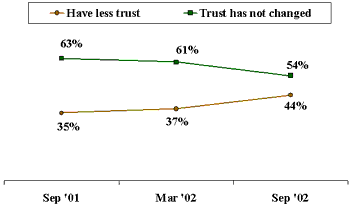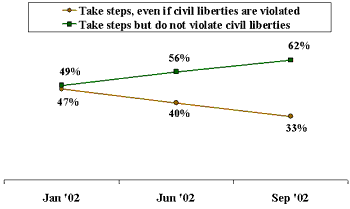GALLUP NEWS SERVICE
PRINCETON, NJ -- Since Saturday, the FBI has arrested five men outside of Buffalo, New York, who are suspected of being associated with Osama bin Laden's al-Qaeda terrorist network. Also, three Muslim medical students were detained in Florida on Friday – and later cleared -- after allegedly making terrorist threats. The two stories bring the issue of domestic security back to the forefront of the news. Recent Gallup Polls show that, even prior to the arrests, the vast majority of Americans surmised that there are terrorists associated with Osama bin Laden in the United States who are capable of launching attacks against this country. A substantial and increasing minority of Americans say they are more suspicious of Arabs living in this country, and a majority say they are now more suspicious of strangers than they were before last year's terrorist attacks. When it comes to the trade-off of increased security from terrorism and respect for civil liberties, however, Americans increasingly come down on the side of civil liberties.
Al-Qaeda Presence in the United States
The five men arrested near Buffalo are all native-born Americans but, according to the FBI, attended terrorist training camps in Afghanistan last year. A Sept. 2-4 CNN/USA Today/Gallup Poll, conducted before the latest arrests were publicized, found that the vast majority of Americans, 88%, believe there are terrorists associated with Osama bin Laden in this country who are capable of launching attacks against the United States. Only 10% believe there are not. But the public is generally confident that the government can protect its citizens from future terrorist attacks -- 80% have a fair amount of confidence in the government in this regard, including 24% who have a great deal of confidence.
Police detained the three Muslim medical students in Florida after a Georgia woman reported that they had made remarks about possible terrorist attacks in the United States on Sept. 13. The public's concern about terror -- exemplified by the woman's reaction -- is evident in the fact that 54% of Americans say they are more suspicious of strangers than they were before Sept. 11, while 46% say they are not. When asked about Arabs specifically, 44% say they are less trusting of Arabs now than they were before Sept. 11, while a majority, 54%, says their trust has not changed. The percentage of Americans who say they are less trusting of Arabs has increased in comparison to readings taken in March 2002 (37%), and immediately following the terrorist attacks (35% in a Sept. 14-15 2001 poll).
| Do You Have Less Trust in Arabs Living in This Country Than You Did Before the Sept. 11 Attacks? |
 |
Civil Liberties Versus Terrorism
Both cases raise questions about the government's treatment of the civil liberties of those of Arab and Middle Eastern descent. The Buffalo-area men were all born in the United States and held jobs or attended school in the area, and some acquaintances of the men were surprised to learn of their alleged association with terrorist organizations. The Florida students were detained for 17 hours by the authorities but a search of their vehicle found no materials that could be used in terrorist attacks. The men deny making any terrorist related threats at all, but the hospital where they were scheduled to train is seeking to transfer them to another program.
The Sept. 2-4 poll found that Americans increasingly favor civil liberties when trade-offs must be made between personal freedoms and protection from terrorism. Sixty-two percent said the government should take steps to prevent terrorism but should not violate civil liberties, while 33% said that terrorist-prevention steps should be taken even if they violate individual liberties. Opinion on this matter has shifted in recent months as concern about future terrorism has subsided. In January, the public was divided in their view, with 47% willing to tolerate violations of civil liberties, while 49% said that liberties should not be violated in the quest to prevent terror.
| Which comes closer to your view -- the government should take all steps necessary to prevent additional acts of terrorism in the U.S., even if it means your basic civil liberties would be violated, or the government should take steps to prevent additional acts of terrorism but not if those steps would violate your basic civil liberties? |
 |
When asked to assess the state of civil liberties in the post-Sept. 11 United States, 30% say they have gotten worse since the terrorist attacks, 11% say better, and 58% say they have stayed the same. But a majority of those who feel they have gotten worse, 57%, say the changes were necessary to combat terrorism, while 39% say they were not. Overall, then, just 12% of Americans hold a critical view of what they perceive to be a worsening civil liberties situation in the United States.
Since the terrorist attacks in the United States on Sept. 11th last year, do you think that individual rights
and freedoms in the United States have -- [ROTATED: gotten better, stayed about the same, or gotten worse]?
[If worse]: Do you think this was necessary to combat terrorism, or not?
|
2002 Sep 2-4 |
||
|
% |
||
|
Individual rights/freedoms gotten better |
11 |
|
|
Individual rights/freedoms stayed about the same |
58 |
|
|
Individual rights/freedoms gotten worse |
30 |
|
|
Yes, necessary |
(17) |
|
|
No, not necessary |
(12) |
|
|
Unsure |
(1) |
|
|
No opinion |
1 |
|
Survey Methods
These results are based on telephone interviews with a randomly selected national sample of 1,003 adults, 18 years and older, conducted Sept. 2-4, 2002. For results based on this sample, one can say with 95 percent confidence that the maximum error attributable to sampling and other random effects is plus or minus 3 percentage points. In addition to sampling error, question wording and practical difficulties in conducting surveys can introduce error or bias into the findings of public opinion polls.
Since the terrorist attacks in the United States on Sept. 11th last year, do you think that individual rights and freedoms in the United States have -- [ROTATED: gotten better, stayed about the same, or gotten worse]?
|
Gotten better |
Stayed the same |
Gotten worse |
No opinion |
|
|
2002 Sep 2-4 |
11% |
58 |
30 |
1 |
Do you think this was necessary to combat terrorism, or not?
BASED ON --313-- ADULTS WHO FEEL INDIVIDUAL RIGHTS/FREEDOMS GOTTEN WORSE
|
Yes, necessary |
No, not necessary |
No opinion |
|
|
2002 Sep 2-4 |
57% |
39 |
4 |
Would you say you are you more suspicious of strangers than you were prior to Sept. 11, or not?
|
|
Yes |
No |
No opinion |
|
2002 Sep 2-4 |
54% |
46 |
* |
|
2002 Mar 8-9 |
45% |
55 |
* |
|
2001 Oct 5-6 |
50% |
50 |
* |
Which comes closer to your view -- [ROTATED: the government should take all steps necessary to prevent additional acts of terrorism in the U.S. even if it means your basic civil liberties would be violated, (or) the government should take steps to prevent additional acts of terrorism but not if those steps would violate your basic civil liberties]?
BASED ON --507-- NATIONAL ADULTS IN FORM A
|
|
Take steps, even if |
Take steps but not violate civil liberties |
No |
|
2002 Sep 2-4 |
33% |
62 |
5 |
|
2002 Jun 21-23 |
40% |
56 |
4 |
|
2002 Jan 25-27 |
47% |
49 |
4 |
Do you think the Bush administration -- [ROTATED: has gone too far, has been about right, or has not gone far enough] -- in restricting people's civil liberties in order to fight terrorism]?
BASED ON --496-- NATIONAL ADULTS IN FORM B
|
Too far |
About right |
Not far enough |
No opinion |
|
|
2002 Sep 2-4 |
15% |
55 |
26 |
4 |
|
2002 Jun 21-23 |
11% |
60 |
25 |
4 |
Would you say that you now have less trust in Arabs living in this county than you did before the terrorist attacks on Sept. 11, or has your trust in Arabs living in this country not changed?
|
|
|
Trust has not |
No |
|
|
2002 Sep 2-4 |
44% |
54 |
2 |
|
|
2002 Mar 8-9 |
37% |
61 |
2 |
|
|
2001 Sep 14-15 ^ † |
35% |
63 |
2 |
|
|
^ |
WORDING: Would you say that you now have less trust in Arabs living in this county than you did before the terrorist attacks on Tuesday, or has your trust in Arabs living in this country not changed? |
|||
|
† |
Asked of half sample. |
|||
Just your best guess, do you think there are terrorists
associated with Osama bin Laden who are currently in the United
States and are capable of launching a major terrorist attack
against the U.S., or not?
|
Yes, are terrorists |
No, are not |
No opinion |
|
|
2002 Sep 2-4 |
88% |
10 |
2 |
* -- Less than 0.5%
